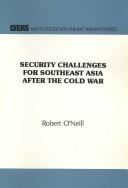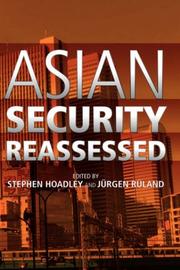| Listing 1 - 10 of 9605 | << page >> |
Sort by
|
Book
ISBN: 1424441781 150906852X 9781509068524 Year: 2009 Publisher: [Place of publication not identified] I E E E
Abstract | Keywords | Export | Availability | Bookmark
 Loading...
Loading...Choose an application
- Reference Manager
- EndNote
- RefWorks (Direct export to RefWorks)
Book
ISBN: 9780199655069 Year: 2012 Publisher: Oxford Oxford University Press
Abstract | Keywords | Export | Availability | Bookmark
 Loading...
Loading...Choose an application
- Reference Manager
- EndNote
- RefWorks (Direct export to RefWorks)
Book
ISBN: 8021077727 9788021077720 Publisher: [Place of publication not identified] MASARYKOVA UNIVERZITA.
Abstract | Keywords | Export | Availability | Bookmark
 Loading...
Loading...Choose an application
- Reference Manager
- EndNote
- RefWorks (Direct export to RefWorks)
This book employs various theories of contemporary security studies to explore some of the most important and most common security issues in Central Europe at this time. Individual chapters of the book adhere mainly to European branches of critical and constructivist security studies,through which they look at some of the salient topics of Central European security politics. The distinction between internal and external security issues is employed throughout the book for analytical purposes. Under this framework, alliance building, security guarantees, “special relationships,” the relational politics of identity, and relations with major powers – documented in the book on the case of Latvia’s relations with United States – are examples of external security issues. Various pressing domestic security challenges, illustrated on the case of Hungarian far-right movements and their activities towards the Roma minority, are examples of internal security issues.

ISBN: 9814376973 9813016434 Year: 1992 Publisher: Singapore : Institute of Southeast Asian Studies,
Abstract | Keywords | Export | Availability | Bookmark
 Loading...
Loading...Choose an application
- Reference Manager
- EndNote
- RefWorks (Direct export to RefWorks)
Excerpt: "We at the end of the Cold war can also draw some lessons from that experience. We can take encouragement from the Un Secretary-General Boutros-Ghali's blueprint to make the UN a more effective global security instrument. But the UN cannot do it all. There are vital supporting roles to be played by regional and sub-regional organizations in building a viable world order within the current UN framework. I must emphasize the contribution which these organizations can make to security not only in their own neighbourhoods but also globally though putting forward their own ideas on this subject in the international debate. ASEAN should do this with confidence, bearing in mind its successful record of solving the non-Cold War problems of state development of the post-1945 period.

ISBN: 981230357X 9812307109 9812304002 Year: 2006 Publisher: Singapore : Institute of Southeast Asian Studies,
Abstract | Keywords | Export | Availability | Bookmark
 Loading...
Loading...Choose an application
- Reference Manager
- EndNote
- RefWorks (Direct export to RefWorks)
This book traces changes in the concept of security in Asia from realist to cooperative, comprehensive, and human security approaches, and assesses a number of policy alternatives to management of both old and new security threats. It surveys not only orthodox security threats such as tensions between regional powers or armed ethnic antagonists but also new sources of anxiety such as resource scarcity, economic instability, irregular migration, community fragmentation, and international terrorism. Security policies of major powers such as China, Japan, and the United States, and the moderating roles of regional organizations such as ASEAN, ARF, SCO, and KEDO are evaluated in historical and contemporary perspectives. Contributors proffer policy-relevant insights where appropriate. The book concludes that traditional security approaches remain valid but need to be adapted to the new challenges, and offers suggestions for incorporating fresh Asian security perceptions into the agendas of policy-makers, analysts, and scholars.
Book
ISBN: 1280118377 9786613522665 9048515556 9056296957 Year: 2011 Publisher: Amsterdam : Vossiuspers UvA,
Abstract | Keywords | Export | Availability | Bookmark
 Loading...
Loading...Choose an application
- Reference Manager
- EndNote
- RefWorks (Direct export to RefWorks)
No detailed description available for "European Security Culture".
Book
ISBN: 3030805956 3030805948 Year: 2021 Publisher: Cham, Switzerland : Palgrave Macmillan,
Abstract | Keywords | Export | Availability | Bookmark
 Loading...
Loading...Choose an application
- Reference Manager
- EndNote
- RefWorks (Direct export to RefWorks)
Book
ISBN: 1003143997 0367699583 1000545989 9781003143994 9781000545982 Year: 2022 Publisher: Abingdon, Oxon : Routledge,
Abstract | Keywords | Export | Availability | Bookmark
 Loading...
Loading...Choose an application
- Reference Manager
- EndNote
- RefWorks (Direct export to RefWorks)
"An exploration of the roles that pro- and anti-government militias, private armed groups, vigilantes, and gangs play in local communities in the new democracies of Southeast Asia. Scholars have typically characterized irregular forces as spoilers and infiltrators in post-conflict peacebuilding processes. The contributors to this book challenge this conventional understanding of irregular forces in Southeast Asia, demonstrating that they often attract solid support from civilians and can be major contributors to the building of local security - a process by which local residents, in the absence of an effective police force, develop, partner or are at least included in the management of community crimes and other violence. They analyze irregular forces' dealings with political actors at the community level, explaining why and how forces are incorporated in and collaborate with legitimate institutions without using violence against them. Offering a new approach to dealing with irregular forces in Southeast Asia, contributors explore new theoretical frameworks that are better suited for evaluating irregular forces' relationship to different security providers and the political environments in the region. Specifically, they examine case studies from Indonesia, Timor-Leste, the Philippines, and Thailand. A valuable resource for researchers, students and practitioners in the areas of conflict resolution, peacebuilding, and security governance, especially those with a focus on Southeast Asia. This book will also be of great interest to scholars of the sociology and anthropology of the region"-- Provided by publisher.
Book
ISBN: 9811675929 9811675937 Year: 2022 Publisher: Singapore : Springer,
Abstract | Keywords | Export | Availability | Bookmark
 Loading...
Loading...Choose an application
- Reference Manager
- EndNote
- RefWorks (Direct export to RefWorks)
Book
ISBN: 1665494042 1665494050 Year: 2022 Publisher: Piscataway, New Jersey : IEEE,
Abstract | Keywords | Export | Availability | Bookmark
 Loading...
Loading...Choose an application
- Reference Manager
- EndNote
- RefWorks (Direct export to RefWorks)
This symposium brings together innovators from leading academic, industry, business, Homeland Security Centers of Excellence, and government programs to provide a forum to discuss ideas, concepts, and experimental results.
| Listing 1 - 10 of 9605 | << page >> |
Sort by
|

 Search
Search Feedback
Feedback About UniCat
About UniCat  Help
Help News
News